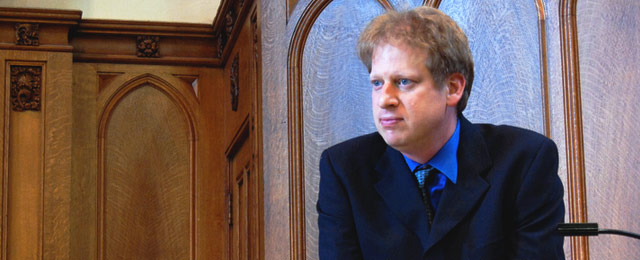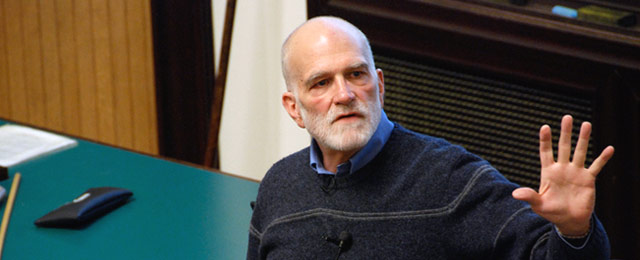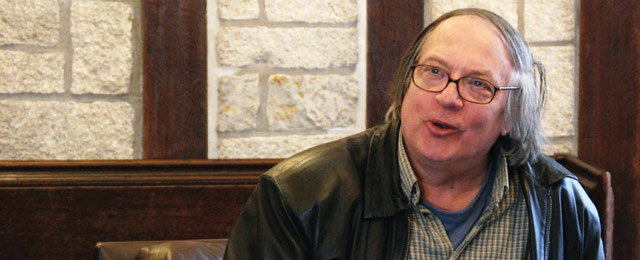Online courses directory (457)
This course focuses on the land use-transportation "interaction space" in metropolitan settings. The course aims to develop an understanding of relevant theories and analytical techniques, through the exploration of various cases drawn from different parts of the world. The course begins with an overview of the role of transportation in patterns of urban development and metropolitan growth. It introduces the concept of accessibility and related issues of individual and firm travel demand. Later in the semester, students will explore the influence of the metropolitan built environment on travel behavior and the role of transportation on metropolitan land development. The course will conclude with an examination of the implications of the land use-transportation interaction space for metropolitan futures, and our abilities to forecast them.
This course focuses on the period between roughly 1550-1850. American ideas of race had taken on a certain shape by the middle of the nineteenth century, consolidated by legislation, economics, and the institution of chattel slavery. But both race and identity meant very different things three hundred years earlier, both in their dictionary definitions and in their social consequences. How did people constitute their identities in early America, and how did they speak about these identities? Texts will include travel writing, captivity narratives, orations, letters, and poems, by Native American, English, Anglo-American, African, and Afro-American writers.
Humans are social animals; social demands, both cooperative and competitive, structure our development, our brain and our mind. This course covers social development, social behaviour, social cognition and social neuroscience, in both human and non-human social animals. Topics include altruism, empathy, communication, theory of mind, aggression, power, groups, mating, and morality. Methods include evolutionary biology, neuroscience, cognitive science, social psychology and anthropology.
This is an introductory course in Greek history tracing the development of Greek civilization as manifested in political
After decades of efforts to promote development, why is there so much poverty in the world? What are some of the root causes of inequality world-wide and why do poverty, economic transformations and development policies often have different consequences for women and men? This course explores these issues while also examining the history of development itself, its underlying assumptions, and its range of supporters and critics. It considers the various meanings given to development by women and men, primarily as residents of particular regions, but also as aid workers, policy makers and government officials. In considering how development projects and policies are experienced in daily life in urban and rural areas in Africa, Latin America, Asia and Melanesia, this course asks what are the underlying political, economic, social, and gender dynamics that make "development" an ongoing problem world-wide.
This course seeks to examine how people experience gender - what it means to be a man or a woman - and sexuality in a variety of historical and cultural contexts. We will explore how gender and sexuality relate to other categories of social identity and difference, such as race and ethnicity, economic and social standing, urban or rural life, etc. One goal of the class is to learn how to critically assess media and other popular representations of gender roles and stereotypes. Another is to gain a greater sense of the diversity of human social practices and beliefs in the United States and around the world.
In 2008, the Beijing Urban Design Studio will focus on the issue of Beijing's urban transformation under the theme of de-industrialization, by preparing an urban design and development plan for the Shougang (Capital Steel Factory) site. This studio will address whether portions of the old massive factory infrastructure can be preserved as a national industrial heritage site embedded into future new development; how to balance the cultural and recreational value of the site with environmental challenges; as well as how to use the site for urban development. A special focus of the studio will be to consider development approaches that minimize energy utilization.
To research these questions, students will be asked to interact with clients from the factory, local residents, city officials and experts on transportation, environment, energy and real estate. They will assess strategic options for the steel factory and propose comprehensive plans for the design and development of the brownfield site.
This graduate seminar examines civic engagement in international, national and local environmental governance. We will consider theories pertaining to civil society development, social movement mobilization, and the relations that nongovernmental organizations (NGOs) have with governments and corporations. During the course of the semester, particular attention will be given to the legitimacy and accountability of NGOs. Case studies of NGO and community responses to specific environmental issues will be used to illustrate theoretical issues and assess the impacts that these actors have on environmental policy and planning.
A clear concise history of art since Prehistory until the beginnings of the Italian Renaissance,
What do your dreams mean? Do men and women differ in the nature and intensity of their sexual desires? Can apes learn sign language? Why can’t we tickle ourselves? This course tries to answer these questions and many others, providing a comprehensive overview of the scientific study of thought and behavior. It explores topics such as perception, communication, learning, memory, decision-making, religion, persuasion, love, lust, hunger, art, fiction, and dreams. We will look at how these aspects of the mind develop in children, how they differ across people, how they are wired-up in the brain, and how they break down due to illness and injury.
This course presents the principles of evolution, ecology, and behavior for students beginning their study of biology and of the environment. It discusses major ideas and results in a manner accessible to all Yale College undergraduates. Recent advances have energized these fields with results that have implications well beyond their boundaries: ideas, mechanisms, and processes that should form part of the toolkit of all biologists and educated citizens.
Facts and information about water and the story of changing human relationships with water over the past 10,000 years.
This course is an examination of the formal structural and textual variety in poetry. Students engage in extensive practice in the making of poems and the analysis of both students' manuscripts and 20th-century poetry. The course attempts to make relevant the traditional elements of poetry and their contemporary alternatives. There are weekly writing assignments, including some exercises in prosody.
This course will explore the mutual influences of ideas of nature, theories of city design and planning, and practices of urban design, construction, and management. We will investigate how natural processes shape urban landscapes (from the scale of street corner to region) and how to intervene strategically in those processes in order to achieve certain goals. We will examine cases of cities that adapted successfully to natural processes and those that did not. Students will then have the opportunity to research a case of their choice and to present their findings for discussion. The subject may be historical or an an example of contemporary theory and practice. Additional information is also available at Professor Spirn's class website.
Aprenderemos cómo podemos usar el pensamiento científico en la vida cotidiana para tomar mejores decisiones.
Students work in small collaborative design teams to propose, build, and document a semester-long project focused on mobile applications for cell phones. Additional assignments include creating several small mobile applications such as context-aware mobile media capture and games. Students document their work through a series of written and oral proposals, progress reports, and final reports. This course covers the basics of J2ME and explores mobile imaging and media creation, GPS location, user-centered design, usability testing, and prototyping. Java experience is recommended.
This course covers the emergence of modern France. Topics include the social, economic, and political transformation of France; the impact of France's revolutionary heritage, of industrialization, and of the dislocation wrought by two world wars; and the political response of the Left and the Right to changing French society.
Sometime after 1492, the concept of the New World or America came into being, and this concept appeared differently - as an experience or an idea - for different people and in different places. This semester, we will read three groups of texts: first, participant accounts of contact between native Americans and French or English speaking Europeans, both in North America and in the Caribbean and Brazil; second, transformations of these documents into literary works by contemporaries; third, modern texts which take these earlier materials as a point of departure for rethinking the experience and aftermath of contact. The reading will allow us to compare perspectives across time and space, across the cultural geographies of religion, nation and ethnicity, and finally across a range of genres - reports, captivity narratives, essays, novels, poetry, drama, and film. Some of the earlier authors we will read are Michel Montaigne, William Shakespeare, Jean de Léry, Daniel Defoe and Mary Rowlandson; more recent authors include Derek Walcott, and J. M. Coetzee.
This course surveys questions about human behavior and mental life ranging from how you see to why you fall in love. The great controversies: nature and nurture, free will, consciousness, human differences, self and society. Students are exposed to the range of theoretical perspectives including biological, evolutionary, cognitive, and psychoanalytic. One of the best aspects of Psychology is that you are the subject matter. This makes it possible to do many demonstrations in lecture that allow you to experience the topic under study. Lectures work in tandem with the textbook. The course breaks into small recitations sections to allow discussion, oral presentations, and individual contact with instructors.
The world is ageing – people are older and societies are facing hard realities. What are we to make our lives in this time of global ageing? In six weeks, we analyze critical questions about age and ageing around the world.
Trusted paper writing service WriteMyPaper.Today will write the papers of any difficulty.






















